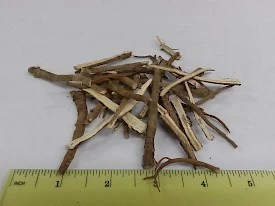Study Finds Xiao Chai Hu Tang Offers An Anti-Depressant Effect
Xiao Chai Hu Tang is one of the most important formulas within the extensive offerings of Chinese herbal medicine. As with many Chinese herbal medicine formulas it offers benefit for a broad range of issues when it is properly used according to the correct underlying diagnosis (see "how to choose an herbal formula" for more on this). In the case of xiao chai hu tang this range of symptoms falls under what we term shao yang disorders; a term indicating conditions that are affecting the  body both externally and internally at the same time. A common example would be someone who had a flu that cleared perhaps weeks or months ago but they have never felt quite right since that time and still get strange vacillations in temperature and symptoms. The formula, however, goes much broader than that.
body both externally and internally at the same time. A common example would be someone who had a flu that cleared perhaps weeks or months ago but they have never felt quite right since that time and still get strange vacillations in temperature and symptoms. The formula, however, goes much broader than that.
Technically the formula falls into the harmonize category of Chinese herbal medicine which are essentially balancing formulas. Without getting into too much detail, basically formulas for colds such as yin qiao use heat clearing and outward moving herbs which taken over long periods or with underlying deficiencies can be too weakening over time potentially creating internal issues, then formulas that too strongly strengthen the internal deficiencies can drive external conditions deeper making them harder to resolve. Xiao Chai Hu Tang is important because it will both help resolve internal issues as well as push out external pathogens without causing problems to either.
In clinical practice Xiao Chai Hu Tang ends up being used for a range of mild conditions such as colds, flus and allergies, through more moderate conditions such as PMS, depression, chronic fatigue syndrome, fibrosis, gastritis and then on to serious conditions such as liver cancer, cirrhosis, pancreatitis and much more.
In the study I'm discussing today we are solely focused on the anti-depressant effects of Xiao Chai Hu Tang. Researchers from Shenyang Pharmaceutical University in Shenyang China recently used a rat model to more deeply understand the biochemical interactions of Xiao Chai Hu Tang and the hypothalamic-pituitary-adrenal (HPA) axis. The HPA axis in the most basic terms possible is the interaction between stress related hormones such as cortisol and the chemical changes in the brain that are involved in a variety of mood disorders. For a lengthy discussion on this phenomena and it's role in major depressive disorders, see "The Hypothalamic-Pituitary-Adrenal Axis in Major Depressive Disorder: A Brief Primer for Primary Care Physicians".
Xiao chai hu tang has been used clinically for depression for generations and there is a general consensus that when properly used it is helpful. It is the "why" and to look specifically at how this formula might modify the HPA axis that is the question these researchers are looking at.
Using a chronic corticosterone induced mouse model (mimicking anxiety and depression in humans) they used a variety of measures including behavioral testing and changes in body weight along with more HPA specific tests such as the dexamethasone suppression test (these HPA tests are described in detail within "Endocrine Testing Protocols: Hypothalamic Pituitary Adrenal Axis").
The treatment was administered for 30 days and they found that Xiao Chai Hu Tang could "remarkably alleviate chronic corticosterone induced anxiety and depression like behaviors" in part by "promoting hippocampal neurogensis and remodeling the integrity of the negative feedback loop on the HPA axis". Further they found a number of active constituents which may offer further avenues for research.
While the science may be detailed, suffice it to say that this formula fits within the harmonize category for more reasons than that category is traditionally used to indicate. Our current medical understandings of depression show that there is a deep interplay between the role of our digestion, our elimination and our stress hormones. Using a formula such as xiao chai hu tang to broadly influence the metabolic and hormonal factors in our mood makes more and more sense the more we understand of these relationships.
tag @yinyanghouse for questions/comments